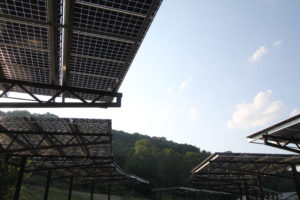
This piece was written by Veronica Coptis in response to a proposed amendment to House Bill 637. For context, see this article in the Indiana Gazette and this one in the PA Environment Digest blog.
I’m from coal country. Like other coal communities, we have been neglected by the rest of the country. I grew up in the shadow of the Bailey mine and witnessed it take over and destroy the landscape near my home. We see the effects of an industry that has left us behind – jobs disappearing, mine lands abandoned, and air and water polluted. Even before the pandemic, we already weren’t on equal footing after decades of inequality and widespread poverty.
But I am also part of a community that works hard to care for our family and friends, looking out for each other’s safety and health. We know it is high time to reduce the carbon pollution from coal-fired power plants and help workers transition to a new clean energy economy.
This past month, Representative Jim Struzzi proposed an amendment to his own bill, HB 637, which makes a one-time $250 million allocation from federal COVID funds for “energy sustainability.” But Rep. Struzzi’s bill’s real purpose is to use vulnerable communities like mine as a prop to stop Pennsylvania from joining the Regional Greenhouse Gas Initiative (RGGI).
Pennsylvania is set to begin participating in RGGI this spring. RGGI puts a price on carbon, incentivizing energy companies to reduce carbon emissions. The revenue produced — totaling in the hundreds of millions of dollars — will help PA fund alternative energy, utility assistance, and other energy efficiency projects for decades if not longer. RGGI will produce more than 27,000 jobs and generate nearly $2 billion in state revenue. Simultaneously, RGGI is projected to cut carbon pollution from power plants in the Commonwealth by more than 180 million tons.
Instead of looking out for his community’s health and economic wellbeing, Rep. Struzzi is using the needs of my community for his political games. Delaying the implementation of RGGI will cost us millions of dollars and further delay transitioning into a place with clean energy jobs and a healthy and prosperous community for generations to come.
We know that RGGI works. In states that have already enacted the program, CO2 emissions from power plants have dropped by 47%, and economic growth has outperformed the rest of the country by over 30 percent.
To make matters worse, the majority of Rep. Struzzi’s funding is allocated for the development of carbon capture technology. Carbon capture and sequestration (CCS) are industry-sponsored technologies that are expensive, unreliable, and not feasible on a large scale. They mean more environmental, health, and safety risks, particularly to existing vulnerable communities like mine. They also mean more profit for the fossil fuel industry.
Rep. Struzzi’s bill also fails to acknowledge who is most affected by pollution and harmful carbon emissions. Rural communities like mine are the first to be left behind by extractive industry, and we’ll be the last to benefit from the transition to clean and renewable energy.
I have long believed in listening to the people who have worked and lived in the midst of fossil fuel extraction, not “expertise” from politicians who see our communities as political pawns to be used as leverage. We are the ones experiencing the brunt of the negative health impacts caused by harmful carbon emissions, and we cannot afford to wait any longer for RGGI to be implemented in PA.
